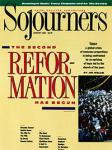The Middle East Council of Churches, in a working paper published in 1988, condemned Christian Zionism as a heretical interpretation of scripture that exalts one particular people over other people in God's creation, and sacralizes Israel as a Jewish state as the fulfillment of prophecy and the instrument of God for world redemption. The Western Christian churches, from which this aberrant theology has originated, are called upon in the document to join the churches of the Middle East in examining and condemning this biased misinterpretation of Christian faith.
Christian Zionism is part of a global phenomenon of right-wing Christianity, emanating mostly from the United States, with ties to militarist national security states such as South Africa, Guatemala, and South Korea, as well as Israel. Right-wing Christianity not only shores up these regimes by sacralizing them as instruments of God against Satan, identified with national liberation movements, but also forms a religious network that parallels the military and economic ties of these repressive regimes with one another.
Although Christian Zionism has its roots in Jewish apocalyptic thought, its modern development began with the Protestant Reformation, particularly among the English Puritans, who built on the long-standing tendency of British Christianity to see the British as the "New Israel," the elect people of God in a religious-nationalist sense. This Anglo-Israelite nationalism was taken by the English Puritan colonists to North America and became the basis of a parallel identification of America as the New Zion.
Along with this Western Christian revival of a nationalist view of divine election, English and American Puritanism posited a doctrine of Jewish restorationism as part of God's redemptive plan for world history: The Jews must return to Palestine and there restore their national sovereignty and rebuild the temple. Either before or after this return, 144,000 of them will be converted to Christ. Christ will return in triumph, defeat the enemy nations, and reign over the earth.
THESE IDEAS WERE REVIVED in the second half of the 19th century by British and American evangelicals who linked the notions of Jewish restoration to a premillennialist dispensationalist view of redemptive history. Political events were read in the light of this apocalyptic scenario. The Gog and Magog of the battle of Armageddon were identified with Russia (before it became communist), while the British (or the American) empires were seen as God's New Israel.
These ideas played a diffuse but significant role in the British sponsorship of a Jewish homeland in Palestine in the Balfour Declaration of 1917, as well as the identification of American Christians with Zionism. Evangelical Christians in the United States generally hailed the founding of the state of Israel in 1948 as the fulfillment of biblical prophecy, as well as a key step in the final conquest of the world by Christ.
It is assumed by these evangelicals that modern Jews are identical with ancient Israel, and that they and they alone have a permanent and God-given right to the land occupied by the ancient Israelites, whether or not they are actually present in these lands. This implies that the indigenous Arab-Palestinian Christians and Muslims have no right to the lands of their own farms, houses, and shops, and that their residency in these lands can be cancelled by the prior divine rights given by God to the Jews.
This Christian Zionist ideology both expanded and was institutionalized in the mid-to late-1970s in response to three developments: Israel's conquest of the West Bank in 1967 (where most of the ancient Israelite sites are located); the ascent to political power of religious fundamentalist and revisionist Zionism, under the leadership of then-Israeli Prime Minister Menachem Begin; and the politicization of Christian Zionist fundamentalism in the United States during the presidency of Jimmy Carter, but particularly under Ronald Reagan, who himself shared a belief in premillennialist apocalypticism.
Among the organizations set up to curry support for the expansionist state of Israel in this period was the International Christian Embassy in Jerusalem. Funded by wealthy American fundamentalists, this organization also gathers funds from evangelicals in Canada, Australia, Holland, South Africa, and elsewhere.
THIS CHRISTIAN ZIONIST NETWORK is an integral part of the global reach of a right-wing Christianity, in alliance with a parallel global network of militarist national security states. For example, since the 1970s, Israel has been a close collaborator with the repressive military government of Guatemala.
When Jimmy Carter was president, he curtailed U.S. aid to the Guatemalan government because of its gross violations of human rights. Israel immediately stepped into the breach and supplied the Guatemalan military not only with guns but also with sophisticated electronic surveillance equipment that enables the military to track all political dissidents and target the victims of death-squad activity.
At the same time, right-wing fundamentalist Christian groups, based mostly in the United States, moved into Guatemala in alliance with the military, particularly under the presidency of Efrain Rios Montt, himself a "born-again" Christian and a member of the right-wing, California-based sect Gospel Outreach. These "neo-Pentecostals" aided the Guatemalan government in its assault against progressive Catholics with a liberation theology perspective.
Leaders of base Christian communities were targeted for assassination, and hundreds of thousands of Guatemalans flocked to join the Pentecostal sects to avoid the repression. During this period some 70,000 Guatemalans were killed, 441 villages were destroyed, and 1.5 million people were uprooted from their homes in the countryside in a "scorched earth" policy intended to destroy dissent.
One can see a similar pattern of right-wing religious and political collaboration in southern Africa. South Africa and Israel have had close military and economic ties, especially since the 1970s. For both nations the military hardware developed to repress their own subject populations has become a major economic export, mainly to other right-wing regimes. South Africa and Israel have also collaborated in the development of nuclear war technology.
The white Afrikaners have their own Christian Zionist state theology that regards themselves as an elect nation to whom God has given the land of South Africa and entered into a covenant with them to defeat the Zulu and other black African people. In the last 10 years, the white government and its controlled media have engaged in a concerted campaign to discredit liberation theology as Marxist and terrorist, and to delegitimize the progressive Christianity that has allied itself with the anti-apartheid struggle.
During this period right-wing fundamentalists, mainly from the United States, were encouraged to evangelize black Africans both in the South African townships and bantustans (homelands), as well as in border states such as Zimbabwe. Groups such as the Jimmy Swaggart Ministries raised funds for Renamo, the South African-supported contras in Mozambique.
Many of these fundamentalist churches have ties to other military regimes; the Rhema Church, with its ties to the Korean CIA, is one example. American fundamentalists, such as Jerry Falwell, came to South Africa to praise the white regime as promoting the true welfare of the blacks and as the bulwark against communism in Africa, and attacked progressive church leaders such as Anglican Archbishop Desmond Tutu.
LAST SUMMER, PROGRESSIVE CHRISTIAN theologians and church leaders from seven Third World nations—South Africa, Namibia, the Philippines, South Korea, El Salvador, Nicaragua, and Guatemala—issued a document called The Road to Damascus: Kairos and Conversion (see "The Road to Damascus," page 26). This document follows in the tradition of earlier kairos documents (by South African Christians in 1985 and by Central Americans in 1988) by targeting two kinds of false theology, often mingled together by conservative as well as mainline Christians: the state theology that sacralizes the state, and its instruments of oppression, as an agent of God, and individualist separation of religion and politics that denies any social ethic at all.
These documents call upon Christians to recognize that the social conflict over religion and politics is not primarily between theism and atheism, but between a true faith in a God of truth, justice, and love; and an idolatry that sets up systems of oppression as representatives of God. Political engagement to bring about both a new, just social order in societies presently ruled by oppressive elites, and a reconciled society where former enemies can live in peace, is integral to the true mission of people of faith.
The condemnation of state theology as both sinful, or morally erroneous, and heretical, or theologically erroneous, echoes the condemnation of apartheid as both sin and heresy made by South African and world Christian bodies. In 1982 the World Alliance of Reformed Churches declared that "apartheid is a sin, and that the moral and theological justification of it is a travesty of the Gospel and in its persistent disobedience to the Word of God a theological heresy." The South African Dutch Reformed Churches were suspended in 1986 from fellowship with the World Alliance until they acknowledge this judgment and repudiate apartheid, both as a theological position of their churches and as a social policy supported by their churches.
Christian Zionism is a central part of this same ideology that condones ethno-nationalist superiority of Jews over Arabs in Israel, and allows this state to expropriate Palestinian land and deprive Palestinians of basic human rights in the name of a divine "plan of redemption." Isn't it time that the progressive Christians who authored the kairos documents. turn a critical eye to this Christian Zionist theology, with its more diffuse echoes in pro-Israel denominational statements, and ask the same kind of questions about its theological and moral legitimacy that have been asked about the Afrikaner theological justifications?
Christian Zionism thrives both by spurious appeals to the Bible and by exploitation of Western Christian guilt for anti-Semitism. It claims that slavish support for the state of Israel, and refusal of all criticism of its policies, is the only legitimate expression of Christian repentance for anti-Semitism. But this is both false friendship and false repentance.
Christian Zionist philo-Semitism is a mask for anti-Jewishness in both the long and the short term. In the long term, the Jews are seen as a people destined to be used by God in an apocalyptic design to destroy other nations and then disappear as a distinct religious community into Christianity.
In the short term, it is a false friendship because it does not accept Jews as complex human beings with faults and virtues, but instead turns them into a cipher for a Christian providential "plan." In the process it mystifies horrible injustice of Palestinians rather than engaging in a critical solidarity with Jews and Palestinians to create a just society in Palestine that would be an authentic expression of the best ethical traditions of all three monotheistic faiths.
The time has come for Western Christians to stop being manipulated by these false appeals to the Bible and to Western guilt, and instead stand up against this type of Christian Zionist ideology as both bad theology and bad ethics.
Rosemary Radford Ruether, a Sojourners contributing editor, was Georgia Harkness professor of applied theology at Garrett-Evangelical Theological Seminary in Evanston, Illinois, when this article appeared.

Got something to say about what you're reading? We value your feedback!



